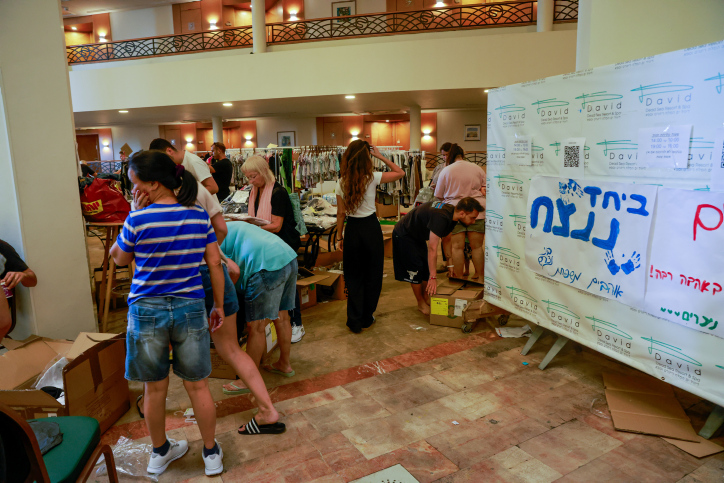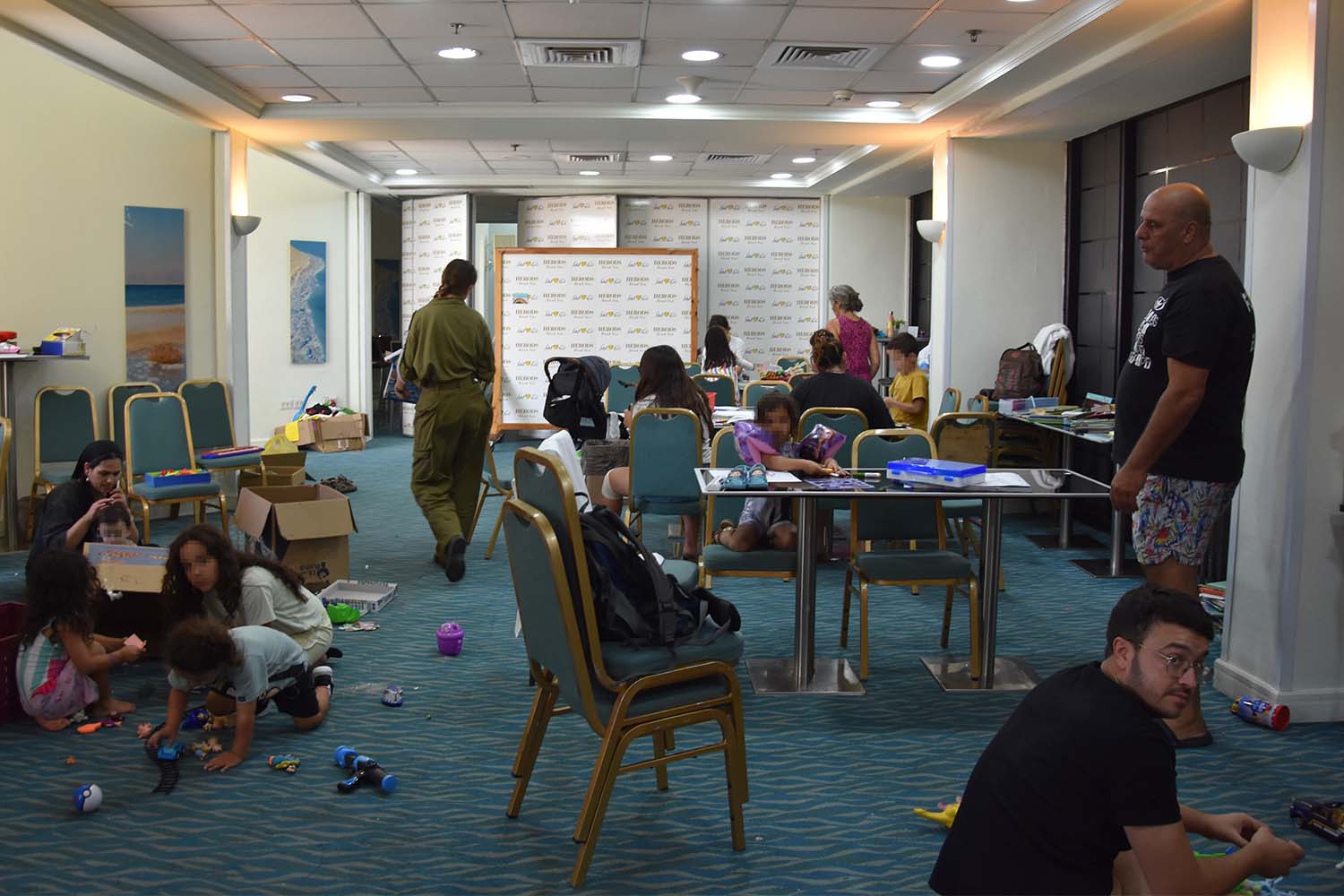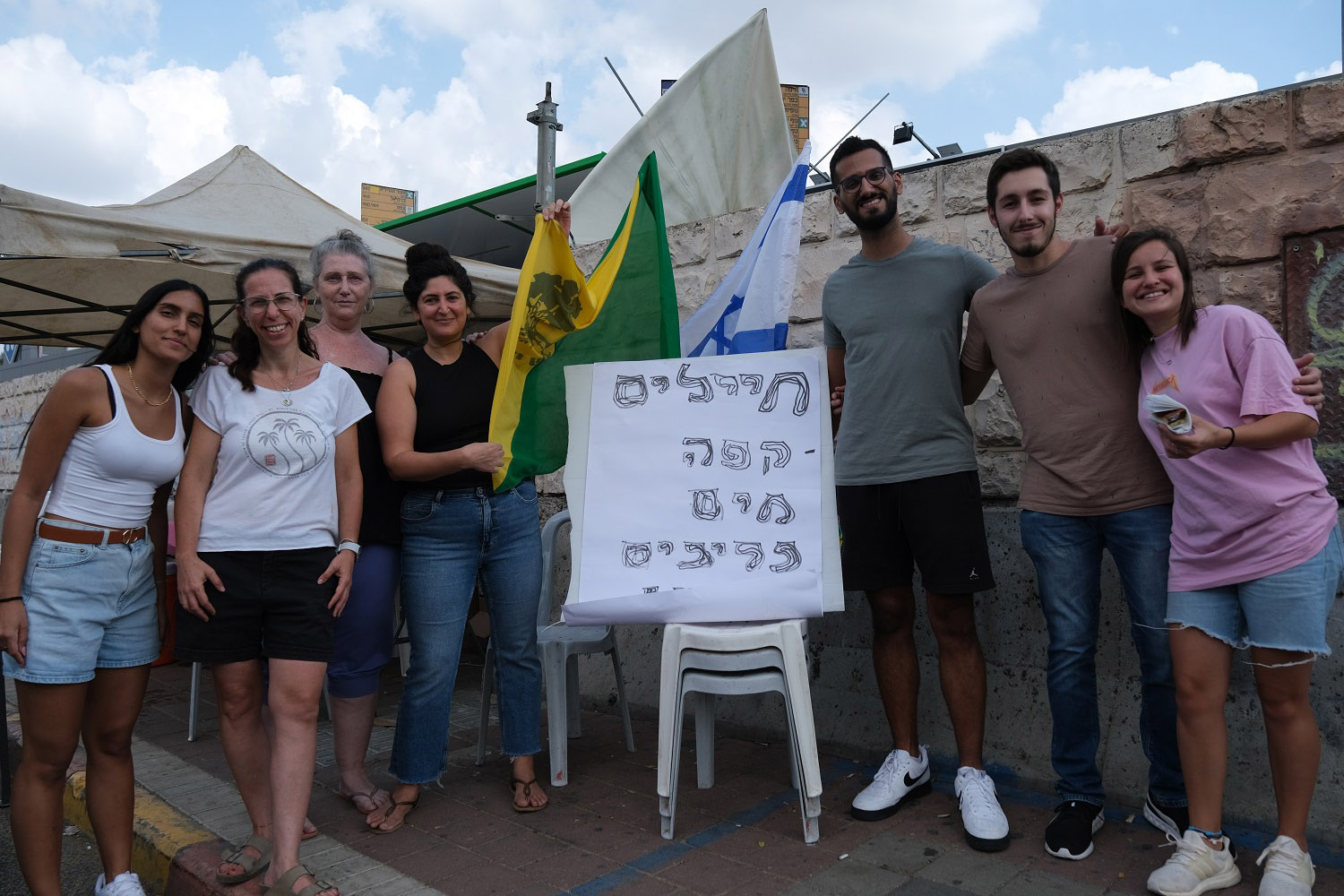
I asked the driver, who has been driving us every day from Tel Aviv to the Dead Sea for the past week, why he takes Route 1 through Jericho and Issawiya in the West Bank, which seems dangerous to me, and not Route 6 south of Arad, which is a safer route. He replied that Route 6 is more dangerous due to the Grad rockets. I, living constantly with the threat of Grad rockets, am afraid of Route 1, and he, who lives in Ma'ale Adumim, is afraid of Route 6. Everyone embraces their fears and keeps them close to them, like keeping close a familiar family member, even when problematic.
Every day we make our way from Tel Aviv down Route 1 as volunteers for the nonprofit "Kedma” which works for social and educational justice. As the landscape changes before our eyes from the green hills of Jerusalem to the yellow desert, I remember my geography teacher and his explanations of the drainage divide. Once I heard a mother explain to her daughter that where the map is green, there is more water and everything blooms, and where it is yellow there is desert. Wrong, I wanted to tell her, it's not a question of water, it's a question of height, and now we're on our way to the lowest place in the world and the greenest on the map. The lowest place in the world is now the place of the greatest sadness in the world, but I kept quiet. Between the truth of a map versus the truth of a mother, I prefer the truth of a mother.
***
I see the great pride in us, we the citizens, who immediately mobilized to establish alternative institutions for a state that has fallen apart. Within days, we established a state within a state, like the Histadrut under the British Mandate. We have a great deal of experience in establishing things – we are a start-up nation. We quickly give away our hard work for next to nothing. There are volunteers instead of the Ministry of Education, instead of the Ministry of Social Affairs, instead of the local municipality.

On Saturday October 7, there were volunteers instead of the IDF. I feel the confidence and arrogance with which we say about ourselves that "there is no one like us in the world" – the brotherhood, the friendship, the love for each other, and I know that I have already seen it in the United States after September 11. I saw the love that the citizens of America paid to the victims and their families, the donations, the mobilization to embrace them tightly, I admired them and did not understand that this is exactly the same disaster. I envied Americans who could come together in this way to rebuild the fragments, I saw it as a strength. I didn't understand what I later understood, when the American disaster almost became my own personal disaster.
I was in Las Vegas in 2017 when a gunman shot 60 people to death. A worried phone call from Israel made it clear that we were near a battlefield. The windows in Vegas are well insulated – if you are not told about the horror outside, you would not hear it. We opened a window and heard the police calling everyone to evacuate north through “the Strip,” then helicopters took off, and on TV they said "ISIS.” I took the heavy pink marble table in the hotel room and pushed it against the door under the handle.
People were not evacuated into hotels, but rather were forced to run along the street outside of the Las Vegas "Strip," north and south. In America, people are not allowed into the property of others without permission, because "private property" is above everything – it is also above the right to human life.
When it was all over and it turned out again that a white man had bought 47 weapons and fired from the hotel at people who had come to rejoice at the concert and dance, everyone calmed down. It wasn't ISIS. This was a familiar incident of violence, and everyone held their fears close to themselves. Immediately the American machine of brotherhood began to work. Everyone praised the security forces, everyone embraced everyone and claimed that a miracle had happened to them, but most of all they opened their wallets and donated. On television, they praised the Walmart employees who had donated bottles of water to the evacuees in the morning. They hadn't drunk any water all night.
I asked a random woman what would happen to the people who were shot and don't have private health insurance, because the United States doesn't have universal healthcare like we do in Israel. She said I shouldn't worry, that everyone would donate to help the wounded and they would be fine. I knew she was wrong. I understood that all of this "brotherhood," all of this so-called "solidarity," was intended to immediately restore the status quo, to silence critical voices that would ask why the government does not deal with things, does not take responsibility and does not pay for the care of the wounded, why weapons are distributed to anyone who has a pulse, why they did not put the evacuees in hotels, why everything opened the next day as if nothing had happened. These are all important questions that could challenge the American regime of money and “property,” the private property.
We are just like the United States. We think that we are the most special and contributing nation in the world, but here the criticism remains – we still remember that it used to be different.
***
Yes, state institutions have been filled with incompetent officials, who are incapable of managing anything. However, they are not the cause of what we are experiencing. They are the result.
"Big Society" is what they call the method. It has a name and an orderly theory that is constantly applied in Israel. Remember when we talked about (right-wing think tank) Forum Kohelet before the war? Today there is no director-general for the Ministry of Education. There is an acting director-general who has never been involved in education and is not qualified for it, but wrote position papers in Kohelet on "improving" the system. Now the system is powerless. At the Dead Sea, women with a "Ministry of Education volunteer" badge are walking around and asking us volunteers if we have volunteer kindergarten teachers. There are about 2,700 administrative staff in the Ministry of Education, but volunteers ask other volunteers if they have kindergarten teachers.
David Cameron, the former British prime minister, implemented the “Big Society” program, which advocates for the privatization of government services, transferring responsibility from the state to the community and private sector. In theory, this sounds beautiful: the community knows its needs and mobilizes for each other. In practice, welfare institutions are collapsing and the community volunteers to replace the state for free, whether through individual initiatives or through nonprofit and civil organizations organizations. Does this sound familiar?
Restaurants volunteered to feed our soldiers, not because of "failures in the food supply chain,” but because of the privatization of IDF kitchens. When the IDF signs a contract with a food supplier, they agree to a certain number of meals per day. It is impossible to increase the contract overnight, as there is bureaucracy involved. A non-privatized kitchen can immediately recruit reservists and start cooking. The organization "Brothers and Sisters in Arms" and private individuals buy bulletproof vests for soldiers, because there is a supply contract to the IDF for a certain quantity and increasing it requires long discussions. The same is true for essential equipment for evacuees who fled from their homes with only the clothes on their backs.

Volunteers have replaced the state, but it turns out that they are now also required to replace paid workers. The supermarket chain Rami Levy appealed to the public to recruit volunteers to work because there are not enough workers, but instead of recruiting paid workers, they are recruiting volunteers for free. Food prices are rising, despite a large increase in demand for food. I ask, why not leave the prices as they were – after all, they make a profit anyway. And then I remember the "invisible hand" of economics, which knows how to provide a contradiction exactly when you need it: an increase in demand = an increase in prices.
The Dead Sea today is the saddest place in the world, the silence and the lifeless eyes indicate that there are no evacuees there, rather there are refugees in their own land.
The hope is the youth movements that painted the hotels blue with their blue shirts, HaNoar HaOved VeHalomed and HaShomer HaTzair, who, just like in the Second World War, established educational and cultural systems together with other volunteers. The children of Kibbutz Be’eri already have a kindergarten and a school. The same goes for other hotels.
The hope is social justice associations like 'Kedma,' which I volunteer for, and all the volunteers, all of them.
We are a wonderful people, we will prevail.
Then we will rebuild the country.
We know how to build.
This article was translated from Hebrew by Benji Sharp.






